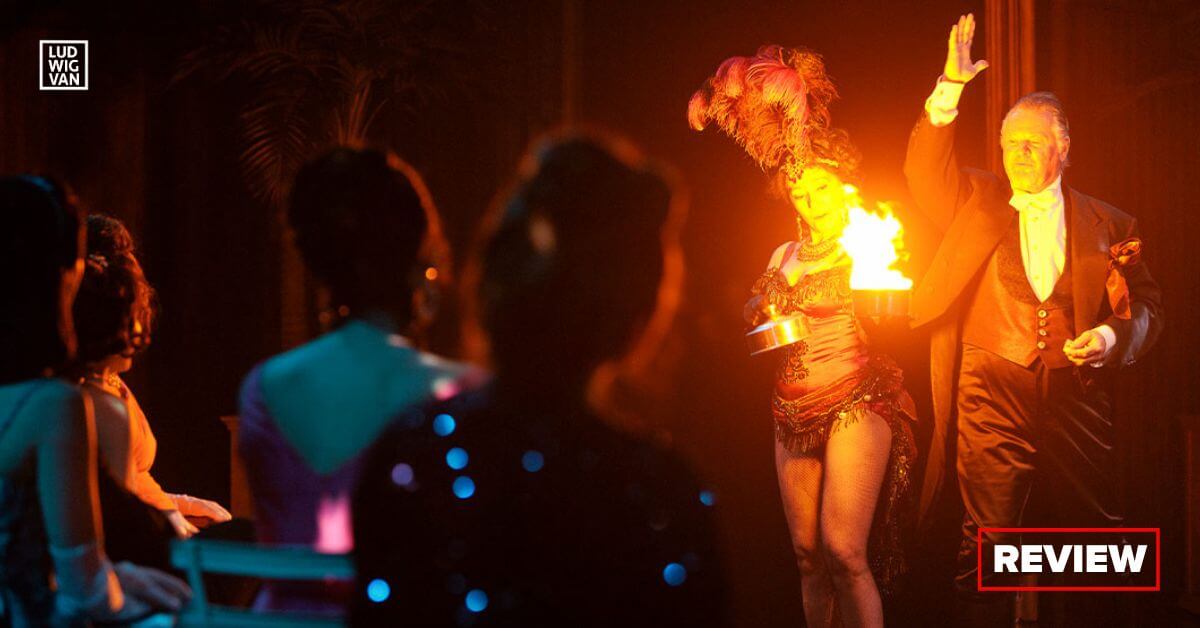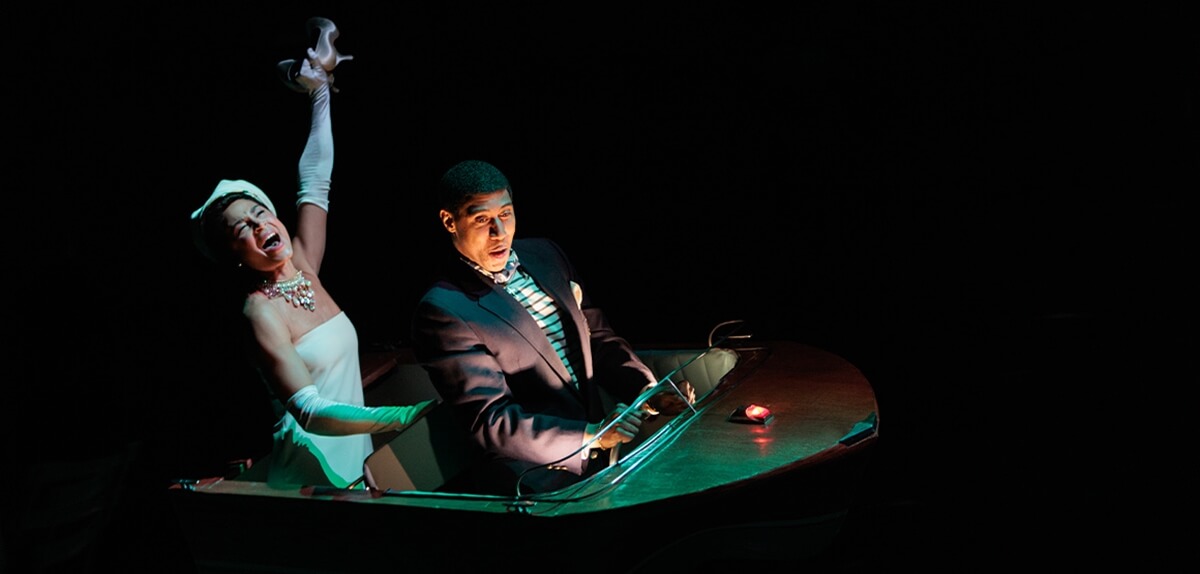
Stratford Festival 2023/Grand Magic by Eduardo De Filippo, new adaptation by John Murrell and Donato Santeramo, directed by Antoni Cimolino, Tom Patterson Theatre, May 6 to Sept. 29. Tickets here.
Of all the offerings at Stratford this year, I suspect that Grand Magic had the least draw. A play by a virtually unknown Italian playwright about a magician — not exactly compelling stuff. I, however, was absolutely thrilled about the playbill.
Playwright Eduardo De Filippo
You may think you don’t know Eduardo De Filippo, but you do.
People of a certain age would certainly be familiar with Vittorio De Sica’s wonderful 1964 movie, Marriage Italian Style, starring Sophia Loren and Marcello Mastroianni, based on De Filippo’s play Filumena Marturano. Some of you might actually have seen that play in translation because it has had several Canadian productions, including one at Stratford in 1997, or you might have attended De Filippo’s Napoli Milionaria that Stratford mounted in 2018.
Nonetheless, I was excited about Grand Magic because I happen to think that Eduardo De Filippo (1900-1984) is a brilliant writer (as well as an actor, director, and screenwriter). He is certainly lionized in his own country, where he is simply known at Eduardo, and where he was made a Senatore a Vita (Senator For Life) by the Italian government in recognition for his contributions to the Italian Republic. Clearly, he is regarded as one of the greatest Italian playwrights who ever lived.
The best thing about a De Filippo play is that you never know where the plot is going to go. Nothing about his writing is predictable. I also love the complex characters he creates. He holds your interest until the end, because you have no idea about the ending he is going to give us. As well, an important point about his writing is that his comedies contain the seeds of tragedy. These are plays of substance and consequence.
Grand Magic, The Play
De Filippo wrote over 50 plays, many about the people of his beloved Naples where he established his own theatre. Grand Magic (La grande magia, 1948) is a little different in that Neapolitan life is not specifically being portrayed here. The play is also approaching the genre of Theatre of the Absurd, the bailiwick of fellow Italian writer Luigi Pirandello, and is more philosophical and psychological than many of his canon, which makes Grand Magic all the more fascinating.
Otto Marvuglia (Geraint Wyn Davies) is a magician/illusionist who has been reduced to staging shows in resort hotels. He thinks of himself, however, as a great performer. He is bribed by unhappy wife Marta Di Spelta (Beck Lloyd) to make her disappear so she can run off with her photographer lover Mariano D’Albino (Jordin Hall). This will be Otto’s greatest trick — a permanent disappearance.
Meanwhile, the hotel guests have had great amusement gossiping about Marta’s pitiful husband, Calogero Di Spelta (Gordon S. Miller) and his unbridled jealousy over his beautiful wife. In his consuming passion for her, he is terrified that she is cheating on him, yet, he can’t bear the thought that she might be.

This is now where De Filippo introduces his very unusual plot twist. Otto convinces Calogero that Marta is trapped in a box. If he opens it, he accepts the fact of her betrayal and the fact that she is gone. He will, however, embrace his wife again, if he accepts her betrayal without ever doubting her fidelity, otherwise she will disappear forever.
Four years pass, and the rest of the play follows Otto’s shameless manipulation of Calogero, who clings to the box, believing the illusion that Marta is inside, always with him and faithful to his love for her. It is a true madness. And of course, the audience is consumed with curiosity; does Calogero ever open the box or not? The brilliance of the play is that it is an illusion in Calogero’s mind created by an illusionist that is, of course, reality. Marta has disappeared.
The two lead characters, Otto and Calogero, play off one another in wonderful fashion, with Miller, in particular, giving the performance of a lifetime as the desperate husband.
Like all De Filippo plays, there are many interesting side characters. Sarah Orenstein is Zaira Marvuglia, Otto’s cynical, long-suffering wife and assistant. Steve Ross is Gervasio D’Aloisi, one of Otto’s unscrupulous accomplices. Emilio Vieira is the Brigadiere, a pompous police officer. Tyrone Savage is the authoritarian head waiter, while Christo Graham is Gennarino Fucecchia, Calogero’s befuddled butler. And then there are a host of Calogero’s family members and neighbours, not to mention the hotel guests, making for a whopping big cast of 27. Let’s not forget the subplots!

The Production
Stratford artistic director Antoni Cimolino’s production of Grand Magic is outstanding, with a thoroughly compelling and absorbing staging, featuring careful detail to character, gilded by Lorenzo Savoini’s brilliant set and lighting, and Francesca Callow’s outstanding period costumes.
Lest we forget, the adaptation by the esteemed late Canadian playwright John Murrell and Donato Santeramo, a language professor at Queen’s University, sparkles with wit and charm, even though it spills over to the dark side.
De Filippo divided his plays into Cantata dei giorni pari (Song of Even Days) and Cantata dei giorni dispari (Song of Odd Days), the first being sunny and optimistic, the latter being pessimistic and disillusioned, even though he considered them to be comedies. Obviously, Grand Magic falls into the Odd Days, but what a scintillating theatrical experience it is.
Cimolino seems to have made it his life’s work to program De Filippo. As mentioned before, he started off in 1997 with Filumena Marturano and Napoli Milionaria in 2018, the writer’s two most famous plays. With Grand Magic, he’s moved into the unknown with a darker play. Let’s hope he gives us more De Filippo soon.
In the final analysis, I firmly believe that De Filippo is also saying that theatre itself is grand magic.
#LUDWIGVAN
Get the daily arts news straight to your inbox.
Sign up for the Ludwig van Daily — classical music and opera in five minutes or less HERE.
- INTERVIEW | Actor Diego Matamoros Takes On Icon Walt Disney In Soulpepper Production Of Hnath Play - April 16, 2024
- SCRUTINY | Opera In Concert Shine A Light On Verdi’s Seldom Heard La Battaglia Di Legnano - April 9, 2024
- SCRUTINY | Lepage & Côté’s Hamlet Dazzles With Dance And Stagecraft Without Saying Anything New - April 5, 2024



